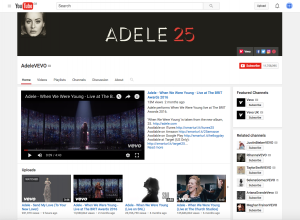
After more than 40 years of operation, DTVE is closing its doors and our website will no longer be updated daily. Thank you for all of your support.
BPI blasts YouTube for ‘meagre’ music revenue contribution
 YouTube contributed a “meagre” 4% of music sales and streaming revenue last year, despite representing nearly 20% of total music consumption, according to a damning report by the BPI.
YouTube contributed a “meagre” 4% of music sales and streaming revenue last year, despite representing nearly 20% of total music consumption, according to a damning report by the BPI.
The British Phonographic Industry (BPI), which represents the UK’s recorded music industry, accused YouTube of profiting at the expense of artists and called on the UK government to “fix music’s ‘value grab’”.
According to the BPI’s stats, there was an 88% rise in music video streaming last year, though these pure ad-supported platforms, of which YouTube is the dominant player, generated just £24.4 million.
This compares to £146.1 million contributed by audio streaming services like Spotify, while total music industry revenues last year came to £688 million – a dip of 0.9%.
“The fact that sales revenues dipped in a record year for British music shows clearly that something is fundamentally broken in the music market, so that artists and the labels that invest in them no longer benefit fairly from growing demand,” said BPI chief executive, Geoff Taylor.
“Instead, dominant tech platforms like YouTube are able to abuse liability protections as royalty havens, dictating terms so they can grab the value from music for themselves, at the expense of artists. The long-term consequences of this will be serious, reducing investment in new music, making it difficult for most artists to earn a living, and undermining the growth of more innovative services like Spotify and Apple Music that pay more fairly for the music they use.
“In 2015, UK fans streamed almost twice as many music videos as the year before; tens of billions more views. Yet artists and labels did not benefit from the increased demand for what they created. This is wrong.”
The BPI described 2015 as a “stellar year” for British music, with UK artists accounting for roughly one in every six albums sold worldwide – a 17.1% global share.


